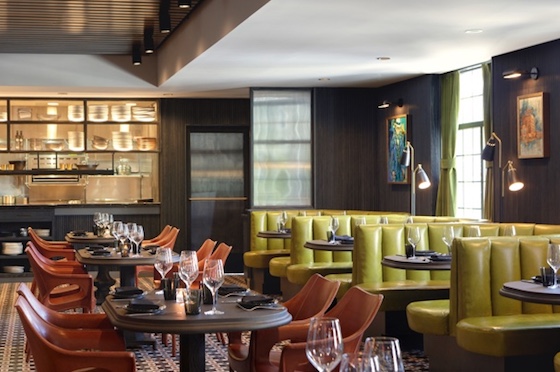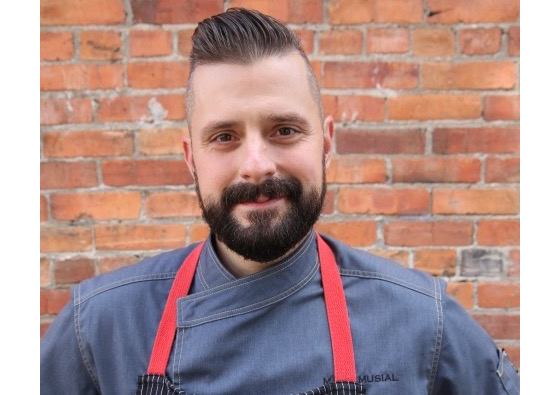As executive chef at the new Kimpton Armory Hotel in Bozeman, Montana, Mark Musial had to rethink how to operate three different concepts (Fielding’s, Tune Up, Sky Shed) while opening in time for the crowds flocking to national parks to as a vacation refuge from quarantine. In this interview, conducted with HOTELS sister publication Plate, Musial talked about how he’s ensuring safety for visitors, employees and locals, and the changes brought on by the pandemic that he thinks could be permanent.
Contributed by Matt Kirouac

What has it been like to open a hotel at a time like this?
Mark Musial: The process has been interesting. The pandemic affects not only dining and drinking, but all facets of opening. The owner has owned the property for 10 years, so this has been an ongoing project. Right before we start to crank, COVID affected construction, and we couldn’t have as many people in here working at the same time. We had to rethink how we were going to approach dining within the space, and for take-away. How do you create an experience with the same amount of impact when they’re taking the dish and leaving the restaurant? We’re trying to recreate that experience outside the space and keep guests safe within the space.
How did the pandemic impact your menu?
MM: It’s affected the entire food market, and our local farmers. We lost the co-op that kept everything together here and made ordering locally easy. We’re trying to keep it as local as possible, and we decided to keep a smaller, concise menu and push the specials. I believe the specials should never be anything you’re trying to unload; they should have ingredients that are great and focus on those hyper-seasonal things we’re trying to keep our hands on at any moment.
We have a signature dish at Fielding’s, the trout. It’s a mainstay here in Montana. And Swiss chard is absolutely fantastic right now, and easy to maintain, so we’re combining those. I’m originally from Arkansas, so collard greens are my jam. So, with Swiss chard, we’re doing a lighter version of that with bacon, shallots, garlic, along with brown butter sauce with citrus and capers. There’s really nice stuff in Montana right now. We have a farmers’ market in a park, the night market. I was just walking through and this local farm had awesome fava beans, so we bought all of them and did a succotash. It’s about seeing what’s out there and making these relationships. This is a market with a budding culinary scene.
What are your dining spaces like right now?
MM: We’re in a mask mandate and we’re taking that very seriously. We’re keeping tables socially distant. We’re not aesthetically taking away from the space, so we’re removing tables instead of just marking them. And we are definitely moving away from printed menus. We came up with a cool URL code that’s on all our coasters, so people have access to the menu.
I can’t tell you how many hours we spend talking about guest safety—how to refresh the linens, mark the tables, address service in an approachable fine dining setting without taking anything away. It’s not easy wearing a mask all day, but it’s gotten easier.
What other operational changes have you made?
MM: We want the kitchen staff to be safe, so we made the menu so that we can keep a good amount of distance between the cooks. It’s a galley kitchen, with a traditional line, but we’re all wearing PPE, and trying to cook safely. We want to have a packed restaurant, but to be safe, we have to control seating and make sure everybody is being safe.
We’re focusing on the take-away dining experience, on having the same plate presentation. For most upscale restaurants, that’s not really the focus. But of course, in a hotel there’s in-room dining, so we’re really focusing on finding nice compostable plateware to recreate the experience we’re offering in our dining room.

What is the market like now? Are you seeing more tourists or locals?
MM: Bozeman is beautiful. It’s actually just an hour to two hours from Yellowstone… People are seeking out spaces near national parks; I don’t foresee people wanting to go into bigger, more densely populated cities anytime soon. There’s going to be a huge boon in national parks, and you can already feel the pulse in this area. Adventure travel is the new wave where tourism is going be headed…
But it’s hard to exist in that seasonal market, so we really hope we can connect with the Bozeman public past the ski season and into the summer. We’re thinking about doing really rad picnic baskets, with a nice bottle of bubbly, a nice meal for guests to take to Yellowstone. It’s about how do we support getting to those nature spots, or something to take with them skiing. Listening to our guests is the biggest thing. If they check in and say they have an early day driving to Big Sky, we’re anticipating those needs, making sure we have breakfast bodega sandwiches for them in the morning before they hit the ski slope.
Have there been any unexpected positives from this?
MM: I think with all hardship comes growth. Nobody gets better at anything with it being super-easy. It’s going to force a lot of kitchens and companies and restaurants to assess what it means to compete in the market, and how are you going to really and honestly protect your guests and staff. That’s where we wanted to start.
When we move past this pandemic, I don’t see it going back to business as usual; there’s going be permanent change in the restaurant industry with how we operate and with safety in mind. This has been a terrible struggle, and it’s affected the restaurant industry like no other, but I do foresee positive change on the other side.
What permanent changes do you think you’ll make?
MM: This is crazy, but as soon as we figure out how to implement the URL thing, I think having the menu on your phone and being able to adjust that daily, with no paper waste. We can really cook hyper-seasonally and have the least amount of impact on the earth by not destroying paper. That might be one of those things that doesn’t go away. I can’t tell you how much restaurants spend in paper a year printing menus.
What have you taken away from all this?
MM: I think the thing that’ll stick the most is the thing that hurts me the most. I have a tremendous amount of survivor’s guilt, because I was able to work during this pandemic while friends and family members were losing jobs and getting furloughed. The biggest thing is to have a ton of gratitude. While this whole experience has been super challenging emotionally and physically, it’s important to have gratitude within the whole thing and feel fortunate. The most impact was the fact that we were able to carry on while the whole world seemed to stop around us.
This story originally ran on plateonline.com, the website of HOTELS sister publication Plate.
